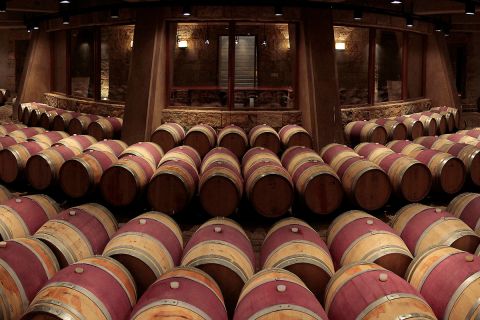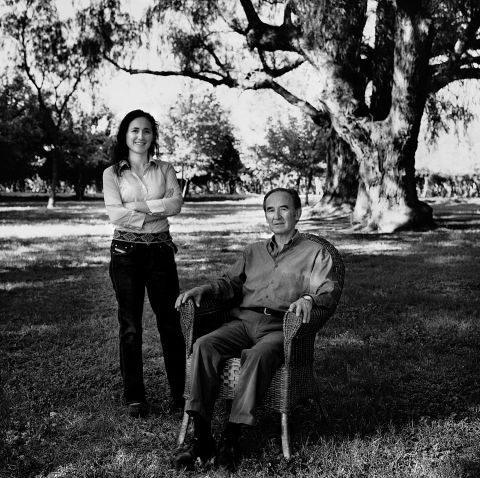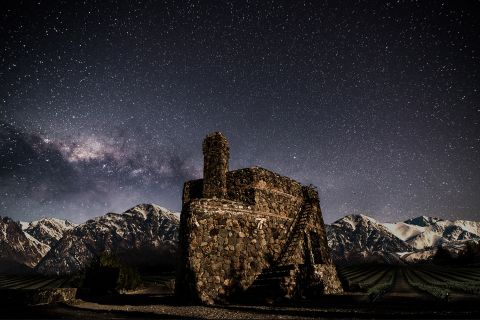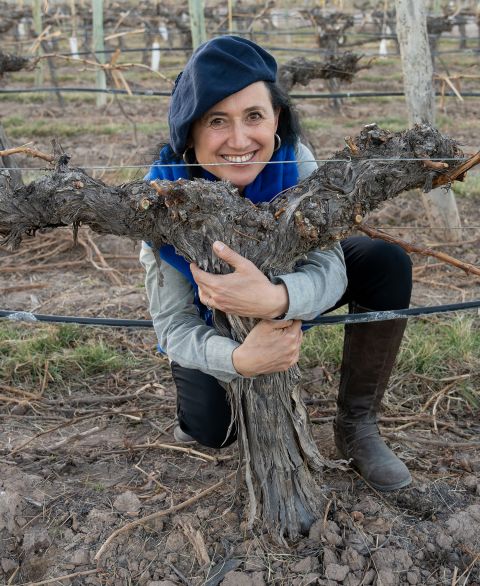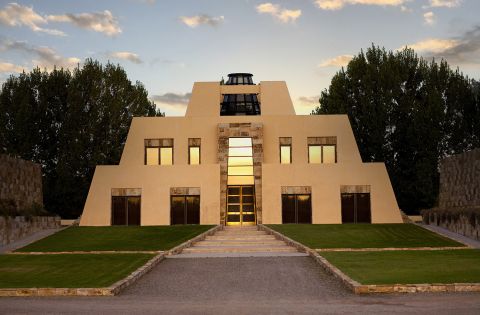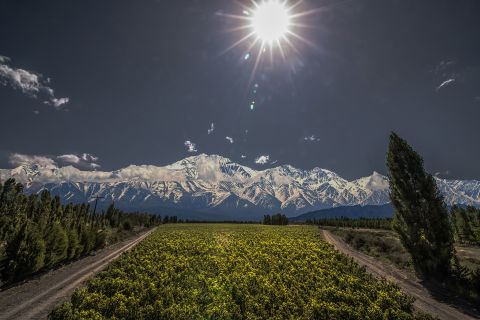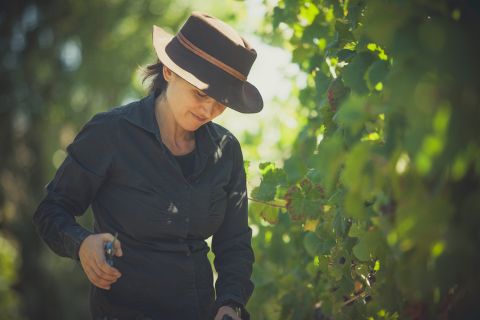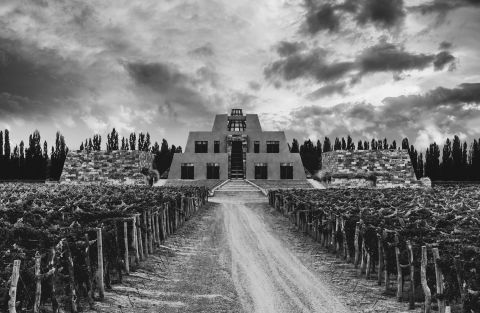Dr Laura Catena is managing director of Bodega Catena Zapata in Argentina, owner of her own Luca and La Posta labels, as well as founder and board director of the Catena Institute of Wine. She was also a practising doctor of emergency medicine in San Francisco for 28 years and is the author of three books and many articles. She is the fourth generation of her family to make wine in Mendoza, joining her father Nicolás Catena Zapata at the winery in 1995. She has collected many accolades over the years including the inaugural Old Vine Hero Award in 2023 and is currently honorary president of the Wine & Spirit Education Trust.
Victoria Has your family been involved in wine for a long time?
I am from a fourth-generation Italian family. My great-grandfather, Nicola Catena, came from the Marche to Argentina with the very specific desire to plant vineyards and make his own wine because his father and grandfather made wine in Italy. I was born in Mendoza and my father had started working with his father when I was born. But my father wasn’t sure if he wanted to be a professor of economics and try and save the Argentine economy (which I’m glad he didn’t as that would’ve been quite difficult!), or if he wanted to work with his father and the winery.
I grew up going to the winery with my father and grandfather; I remember that winemaking was a man’s world. My father always equally encouraged myself, my sister, and my brother to study hard and there were no greater expectations for boys over girls, which was rare. At that time in Argentina the idea was that if you were a man, you needed a good job that paid a lot of money, and if you were a woman, you needed a good husband. And it’s not that long ago! But my father had great expectations. In the end my grandfather was more likely to take my brother to the vineyard and I would take care of the dogs. That was my ‘side-door’ into the winery, to hang out with my grandfather. But the winemaking was reserved for the men, and in my generation that was my brother.
Do you remember a key moment when your fascination with wine began?
I honestly had no intention of going to work for the family winery. I studied medicine and I wanted to be a travelling doctor helping people all over the world, which I got to do somewhat. I did have a career as a doctor but always part-time because I was also working for the winery. When I was going to school, I didn’t think that people making wine were making a big difference in the world because, to me, those jobs were as a teacher, as a doctor – you had to be in service.
But today I manage our winery which provides jobs that elevate Argentine wines, and we are helping our whole region with all the research that we do and share. Then there’s the joy that wine brings to people. I honestly think that I’m making a greater impact as a winemaker than as a doctor. Back then I thought I would drink the family’s wines rather than make them. However, the moment that I decided that I wanted to work with my father was when I started going to France with him because he wanted to check out the competition. I had studied French since I was quite young and in the wine world it can be quite useful. He invited me as his translator, and I fell in love with drinking wine. I still thought that I was going to be a doctor. Finally, my father asked me to go to this wine event, the New York Wine Experience. He said, ‘Laurita, nobody here speaks English, you have to go.’ So I managed to trade some shifts at the hospital and I showed up in New York where we were the only South American winery.
I remember being in my booth and people walking by and seeing Argentina and just being ignored. Back then in the mid 1990s, it was all France and Italy and Spain. I saw my father’s dream of putting Argentina on the wine map as almost impossible! I called him and said, ‘Papa, I have to come and help you because you need so much help.’ Of course, my arrogance as a young person came through and my father was thrilled! I think he pretty much would’ve put me in charge of the winery right there and then.
Tell us about your decision to study medicine at university.
I like science and I like people. It’s a great profession because you have instant gratification. You also see a lot of suffering but you can make a big difference to people’s lives. Also, I did emergency medicine so you’ll have a parent that brings in a child who is hurt. The parent is terrified, the child is crying and within an hour I’ve fixed the child. I’ve fixed the parent. Everybody’s happy. It’s the most incredible feeling.
Winemaking takes a lot more patience because you have to blend the wines before they make a really great wine and that’s 10 to 15 years. You also must research and study and wait for a while to see if the wines can age well. I loved medicine because it felt like I was making a difference all the time, every day, every minute that you’re working. I actually said to my father, ‘Papa, why didn’t you tell me wine was so great?’ Because it’s science and there’s people. He said that if he’d told me to go and work with him then I wouldn’t be working with him now. It was important that I came on my own. That’s something I’ve discussed with other family wineries. You should wait for people to come on their own.
Now I’m only doing wine and have stopped being a doctor because my father doesn’t want to work as much, and I have so much work to do in Argentina and all over the world. I don’t know how I used to manage both my hospital shifts and the winery. The one thing I would say is that I had a friendly transition into the family winery as before I had my own separate job where I was responsible for myself and where I had a good boss and a bad boss. That taught me a lot about how to be a boss and what I don’t want to do as a boss now. It’s been a real privilege to have been in a different career where you get to be an employee and see what it’s like and what’s difficult.
You joined the family winery in 1995 and immediately founded the Catena Institute. Why?
I had been going to Mendoza and tasting the wines since the late 1980s and early 1990s. At this time, I was studying biology as an undergraduate at Harvard, and then I studied medicine at Stanford. So, it was in the summer holidays that I would go to Mendoza and taste all the wine. But it was at that New York Experience that I realised how good the wines were around the world. I said to my father, ‘you know, if we want to make this level of wine, we need to do a lot of research as our place is so different from everywhere else.’ We have this fine mountain climate, different soils and the Malbec variety that nobody knew much about at the time.
It had to be good research, well controlled so that we could reach conclusions. Part of the reason I wanted to go work at the winery was to do that research. I didn’t know anything about selling wine or the commercial side, so the research was the only thing that I could really contribute to because I had done medical research. Once you know how to do research, you know how to set up an experiment.
Your father played an enormous part in putting Argentine wine on the map. How did you feel about taking on his mantle?
We’re all a step in a long history. My name, Catena, in Italian means ‘chain’. I think of history and families and multiple generations as a little link in this long chain. People often ask me what it’s like to have this very famous father. My father is so smart. When I listen to him talk, I’m bewildered every time – he is so intelligent, so thoughtful, so brilliant. I’m not one of those people who think, will I be as great as my father? I am continuing his vision of making Argentine wines that can stand with the best of the world and the only contribution of mine is that instead of doing that now, I’ve said let’s do it for another 200 years. Our family has made wine in Argentina for 120 years and if you count the Italian history of winemaking, it’s about 200 years in total. Can we do this for another 200 years and at the same time elevate the whole region? Because that is part of what my father’s vision was.
I feel like I’m even more obsessed with the vision of the whole region because I really think that the work we have done at Catena – to elevate the prestige of Malbec, with these Cabernet–Malbec blends like Nicolás Catena Zapata that are ageworthy, with single-parcel Malbec, the work preserving mass selections of Malbec – would be lost to the world because they don’t exist in Europe anymore. All this work in sustainability and the ecosystem is working to preserve the culture of the countryside. There are so many people leaving the countryside for the cities. All this work is almost like I’m a doctor in the hospital. It’s not about my title, it’s about the patients that come to the hospital. How can I do right by each of them, fix their problem, make them better. I need to make sure that this family winery and these vineyards are all preserved. I’m basically a worker, one more person in this link. And I’m joined in this link by all the people in the Catena family, who are working or have worked in the past, or who will work in the future. I really see our role as people as being part of the system. I’m no different from that little microbe in the soil that’s helping the root to absorb water.
You’ve dedicated your book Malbec Mon Amour not just to ‘the land of Mendoza and its inhabitants’ but also to the ‘bees, the owls, the skunks, the insects, the plants and the microbes’. As you say, it’s an ecosystem with many interconnected players.
They are just as worthy. We are these human dominators and that’s a fact – we have to accept that. In order to stay on this earth, we need to make sure that all this nature surrounding us stays. I’m actually part of this think tank where people are talking about how to preserve old vines and how to do regenerative farming with carbon absorption in the soil. I think that winemakers and viticulturists are taking a real leadership role.
The other thing is asking what else is it that you consume and put into your body that comes from so many different parts of the world? So many people have put their whole life into that. It’s the reason wine is still so popular because we humans seek to connect to the earth and through wine you connect to the earth all over the world.
In 2013, the Catena Institute of Wine helped to develop the first vineyard sustainability protocol in Argentina. How come?
I had a customer ask me, is your wine sustainable-certified? I remember thinking wow, I’ve read about sustainability, but do we have a certification at Catena? And this was in the early 2000s. I called my head of viticulture and asked if it was something worth looking into. But at that time nobody was doing anything; it was just talk. My theory in life is that if something hasn’t been done, I need to just go and do it. This is part of my father’s teaching; he did so many things that nobody had ever done. He planted in this place where people said the grapes wouldn’t ripen. He decided to make a great Malbec when people were pulling out Malbec and replacing with Cabernet Sauvignon. I mean, what would have happened to Argentina today if he hadn’t made that decision?
So I said let’s create a code. We gathered codes from Europe, from New Zealand, from Chile, from California and realised that none of these could be applied to us because we have a completely different climate. For example, in California they want to keep the forests because they have all these pine trees but in Argentina, we have a naked floor which is more akin to a desert. We have owls that live underground. To support a bird habitat we had to do things differently than they do in California. We had to research for several years to come up with this sustainability code and then we had our vineyard certified. I said well, how useless is this! This just applies to us – we need to get other people to use this code! So we partnered with Bodegas de Argentina and they had a technical commission. Then we made it available to all of Argentina. Now there are over 100 wineries involved and we’re continuing to get more and more people to join.
The most wonderful thing about the code is that we’re now working together with other wineries on big projects. In the olden days in Argentina, we were friends with other wineries but wouldn’t see each other much except at big events and it was rare to see wineries working together on big challenges. This provided a platform for us to work together. We’re now working on bottle weight, vineyard health, vineyard viruses. We’ve done this whole training programme for wineries to understand water deficiency. It’s given us a platform to work with other wineries and that’s been the most interesting part of the sustainability code.
How does being a family business change your approach to sustainability issues?
I think there is this sense that you are thinking of leaving the world at least as good a place as you found it. Hopefully not worse. If you can leave it a better place, that’s amazing. But that’s unlikely given climate change and all the things that are happening. I think there’s definitely this sense of the next generations. At Catena, a lot of the team are from Mendoza. That is something that is a little different about Argentina. Most people don’t leave to go somewhere else. In Argentina a lot of the children of people who work at Catena will stay in Mendoza and work there. Now we have multiple children of these families who are working at the winery. The sense of the future is shared with our whole team. Our 200-year vision is ingrained in every person.
I once had someone from France commenting on the fact that we have husbands and wives working together in the winery and saying it must be complicated. We have many of them and it works. Usually, they’re not working in the same department, but we have a woman who happens to be the boss of her husband (as well as others in the team) and that’s one of our best groups of people. They’ve been married for 20 years or so. I think things happen in Argentina that don’t happen in other parts of the world, and it works.
Your Adrianna vineyard is perhaps the most studied vineyard in the world. Explain.
I’ll talk about the Mundus Bacillus, which is the Malbec, and is right at the centre of the vineyard. We were always getting our best grapes from that sector, and they tasted the best. It’s a tiny 1.5-hectare [3.7-acre] area. The Adrianna vineyard is an old, dried riverbed so it has multiple soils. One of the things we realised was that we needed to subdivide the vineyard into sections because some had deeper soils that retained more water and needed a different cover crop than other sections that were very stony. What we realised was that we needed to understand the soil and the microbes in the soil and the behaviour of the plant in order to know what to do with each plot. All this attention to each parcel resulted in a better wine.
It’s not something we invented. Look at Burgundy for example where they have such careful viticulture. Some parcels do just make better wine – it’s a fact of nature, and of wine. To give an example, for the Mundus, we did a microbial study because somebody said it was too dry to have microbes in the soil. We had so many microbes in the soil! We actually discovered two varieties of bacteria that live within the roots that had never been discovered before, so we sent them to a registry in Switzerland. This parcel has very shallow soil with a lot of limestone; it’s a very stressful place for the vine. This is also an organically farmed vineyard so we had to be really careful about how we preserved those microbes. We ended up also studying them again after we had put in a legume cover crop, and we also tried doing nothing. (This sometimes works really well, just letting wild cover crop grow.) It turned out that the legume cover crop worked much better and we could control it better. The vineyard looked healthier. It took about 10 years for all of this to happen which was the result of first realising that we did have a lot of microbes, then testing two different cover crops, then seeing that the microbes increased, then seeing that that resulted in a better wine.
With your medical hat on, what parallels do you see between human biology and vine biology?
Microbes are a great example because we’re finding that microbes are so important for our digestion and to protect our skin. If you eliminate your microbiome, you have a higher risk of heart disease and of many cancers. This can happen if you’re taking too many antibiotics or you’re not eating well. I think we’re seeing similar things in the vineyard: when you have a healthy soil with a good amount of microbes, you’re making better wine. That’s a big parallel.
I think that medicine is also a combination of art and science. I always say that as an experienced doctor, when you walk into a room you know if a person is sick or not. I think there’s a parallel in a vineyard, you can measure water and run tests but the best way to figure out what’s wrong is to ask whoever manages that vineyard and has been for 10 or 20 years. That person knows and they take cues that you can’t even put in writing. They’re going by instinct. There are so many parallels between wine and medicine in terms of instinct. They’re both scientific fields that have a high level of instinct.
What are your ambitions for the business for the next 20 years, and the next 50 years?
One of the things which is happening in Argentina is water scarcity. Mendoza, which would be like the California of Argentina, the main wine-producing region, has limited water resources and the glaciers every year have less water. Our vineyard land is still very unpopulated so I think we’re perhaps a little safer, but there is definitely water shortage. So one of the things we’re doing is planting vineyards in the north of Argentina in Salta, in La Rioja and also in Patagonia where there are different water sources for farming and where there are fewer people to compete for water with.
What’s really exciting is not just that we’re going to make wine from these regions. It’s also what we can bring to the people of those places. Some of these regions are not as wealthy as Mendoza. If you can bring an economically feasible crop to these places and something like wine which is fun, you can make a change. When I travel around Argentina I love to talk to the people who have been working with our family for years who tell me about my grandfather. I remember meeting this man who was really old and I was a little worried about him working so I asked his boss. The boss told me that this man gets very upset when people ask about retirement because he wants to work until his last day. It’s scary for him because he thinks he’s being pushed away. He’s actually a very good worker. It’s stories like these that makes me think what a beautiful thing it is that I can provide this job for this person that makes them so happy that they don’t want to retire!
Were there any challenges to overcome as managing director in the early days?
When I first started going to the vineyards, I felt great because to me that was biology. That’s what I studied, and I understood research, I understood vines. I actually took many classes in plant biology because I find it fascinating. I remember one time I went with our head of viticulture who was this wonderful, charismatic man. I’m sure he was annoyed by me, the owner’s daughter who was a doctor, showing up and asking lots of questions. I was saying things like, ‘this isn’t very good control here, the soil looks different’ and I remember him looking at me he said ‘you know, Laura, we need a lot of help in marketing. I think you should go and work in marketing’. I remember thinking, ‘God, what is marketing? I’m a doctor. I’m a scientist. I don’t know anything!’ I dismissed it and now [I realise] marketing is a profession which is just as hard as being a doctor, maybe even harder. Selling wine is not a simple task. You have to know the wine drinkers, the wine trade, every country has different legislation. Now when I look back, I feel that [suggestion] was ridiculous! So I think there was a little bit of prejudice that women should be in certain traditional roles like public relations and marketing. But of course, women are good at everything! There was a sense that a woman should be in that side of the industry and not in the production side. Today we have many women in the production side. I’m involved in everything, but my favourite thing is viticulture.
What should we expect from Bodega Catena Zapata in the coming years?
We have this vineyard nicknamed the ‘supersonic’ vineyard which is where we’re keeping all the diverse selections of Malbec, Bonarda and even some selections of Chardonnay that are now the main high-quality Chardonnay in New Zealand and Australia. We have Cabernet Sauvignon selections and we have Criolla selections (our native grape). The place is so beautiful, and you’ll drive there and there are no houses, just the occasional horse or dog. Then finally you’ll arrive and there’s a family who have chosen to live here in this very remote place who are so committed to the project of preserving all these old vines. Multiple people in the family work in this vineyard. The house is gorgeous with an orchard, and they own about a million dogs. Then there are vines after vines, all labelled – it’s like a museum of vines.
I am very excited about this project because we had the vision of doing it, but it seemed difficult because we had to do the testing on all these vines. The vines planted here actually don’t have viruses and we have tested them all. The supersonic vineyard is only half planted, the other half of the work will take another 10 years. Just the fact that we have this place, it’s like we built a museum and there’s art in it and it’s thriving.
This place has to be far away from other vineyards because there are vectors that can bring diseases. If you think about COVID, the reason it spread so much is because nature and people are living close to each other. Well, vineyards are the same.
What are your thoughts about the next generation coming into the family business?
My brother makes his own wines. My sister is now working with me, which is so exciting as she’s a historian. If people ask what you should study to go into wine, I think history is the perfect field – she has so many ideas. There are eight grandchildren of my parents and so far, one of my sons has made wine several times. He already has made a rosé from Pinot Noir. He wasn’t aiming to make a rosé but because he didn’t macerate the wine for long enough it actually turned out to be this incredible rosé that’s delicious. So, he’s somewhat interested in the business.
Another son is doing a PhD in chemistry, and he wants to do pharmaceuticals so I’m thinking that’s very wine-related. I’m taking my father’s approach. But here [in Sonoma – at a symposium] I have met the owners of South Africa’s Creation winery, Carolyn and JC (Martin), and I’m very envious of them because their son is already a winemaker and their daughter is also going to work at the winery. And now I’m feeling like, oh no, is my father’s approach of just letting them do their thing and come back themselves correct? I’m having a nervous moment because so far, I don’t have a next generation, but hopefully I’ll get as lucky as my father.
What region, other than Mendoza, would you make wine in if you could?
My father would like us to make wine in California because he thinks that Argentina is so high-risk economically. I personally feel that you can only make great wine among the best in the world in one place. You have to only think about that all the time, every day, every weekend, every vacation. If you’re not thinking all the time of your vineyard, you will not make the best wines in the world, which is our objective. I would love to make wine in Italy. I have an Italian passport, I speak Italian, I’ve spent a lot of time in Italy and I like all of it. The romance of wine goes with me everywhere. I see a vineyard and I’m in love. Right now, I’m at this symposium in Sonoma and yesterday we were looking at old vines and I was standing next to them thinking, I love you so much. I basically would be happy making wine in almost any place in the world. I do not plan to, though. I make wine in Argentina.
Finally what advice would you give to your younger self when taking on the position of managing director?
I feel like I’m an optimist. I’m a little Candide from Voltaire: whatever happens to me, I rationalise why it was good that a bad thing happened. I do wish though that I had spent more time in the winery and in the vineyard because once I started working for the family winery I ended up having to travel so much. I’ve been on a plane for most of the past three decades. I had young children so I’d be running to and from airports, coming back, going to work in the hospital. The work in the winery and vineyard is very contemplative. Every year I will do a day of harvesting because I want to be there in the vineyard, and I want to have experienced that vintage in the flesh. So, yes, I wish I had spent more time doing the labour in the winery at the beginning of my journey. But in a way, I wouldn’t change anything.
All images courtesy of Bodega Catena Zapata.
This interview has been edited for length and clarity. You can read the full text at Bordeaux Index. Members of JancisRobinson.com can also access over 150 tasting notes on Catena wines in our database. Not a member? Become one now!


